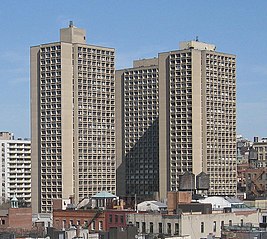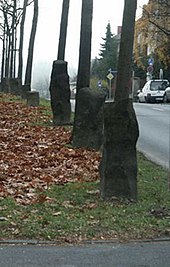禮拜天美術神遊 (63):Bust of Sylvette, NYU: University Village. SYLVETTE DAVID, 精彩的訪談 An Interview with Picasso's Famous Model and Muse, Sylvette David: 'The Woman with the Key,' by Rob Couteau
http://www.tygersofwrath.com/Sylvette-David-Interview.htm
Picasso's Bust of Sylvette | Art Nerd New York
art-nerd.com
NYC - Greenwich Village: Picasso's Bust of Sylvette | Flickr
flickr.com
October 17, 1967 – “Sylvette” gets the go-ahead - Village Preservation
villagepreservation.org
The Real Bust of Sylvette | Art Nerd New York
art-nerd.com
Picasso's Bust of Sylvette, by Carl Nesjär — COCKTAILS & CURIOSITIES
cocktailsandcuriosities.com
Daily Photo Stream: Bust of Sylvette
dailyphotostream.blogspot.com
University Village

The Silver Towers and 505 LaGuardia Place

Wikimedia | © OpenStreetMap
General information
Type Housing
Location Greenwich Village
紐約市大學廣場公寓(University Plaza),高達三十六英尺的「西維特像」,聳立在庭院,
19 I.M. Pei貝聿銘誌念
一九六六年完成的紐約市大學廣場公寓(University Plaza),高達三十六英尺的「西維特像」,聳立在庭院,貝聿銘終於圓了擁有畢卡索作品的心願。

* Although the site was landmarked in 2008, in 2010 NYU attempted to get permission to construct a fourth, even higher tower, which would have blocked the view of the bust. But because of fierce opposition to the project – which included a letter of protest from Sylvette herself – the plan was withdrawn.
In the courtyard at the center of the complex is a 36-foot-high (11 m) cubistic sculpture known as the Bust of Sylvette.[8] As its name indicates, it is a sculpture in-the-round of the head, neck, and shoulders of a woman named Sylvette David.[3][9] It was created by the Norwegian artist Carl Nesjär in 1968 and was done in collaboration with Pablo Picasso, who had created a 2-foot-high (0.61 m) version of the sculpture in folded metal, in 1954. Picasso was living in the south of France when he met the 20-year-old Sylvette through her boyfriend, Toby Jellinek .[15] Picasso was captivated by her blonde hair and face, and she would become the subject for over 40 pieces of artwork he produced during 1954.[15] The sculpture is noted for its use of the betograve technique of sandblasting concrete to create different textures and received a New York State Award from the New York State Council on the Arts in 1969.[3] A further plan by Christo and Jeanne-Claude in 1972 to wrap the sculpture in brown fabric was never completed.[3]









